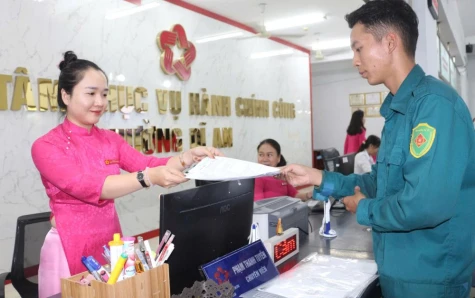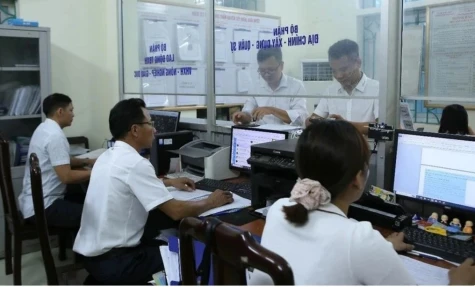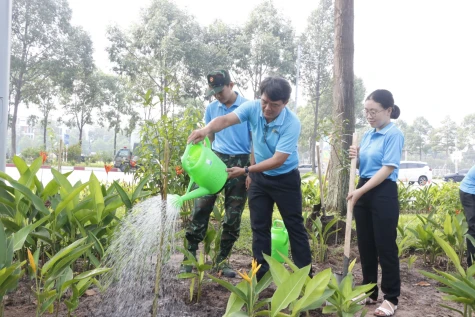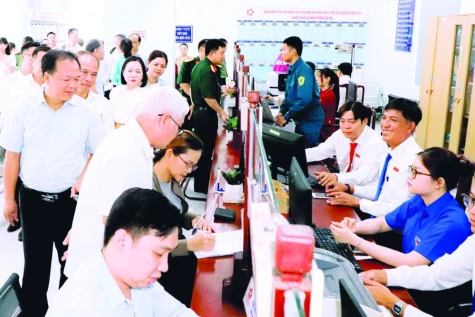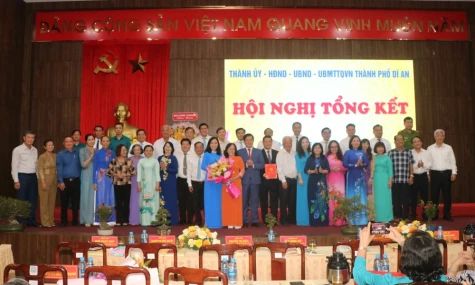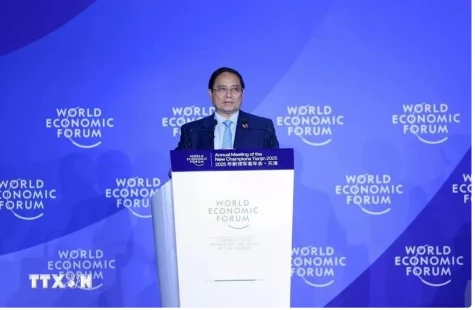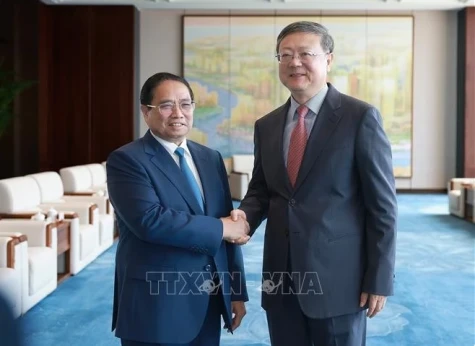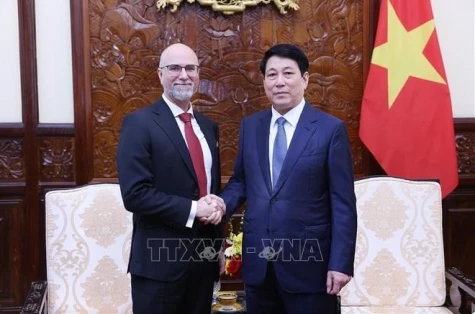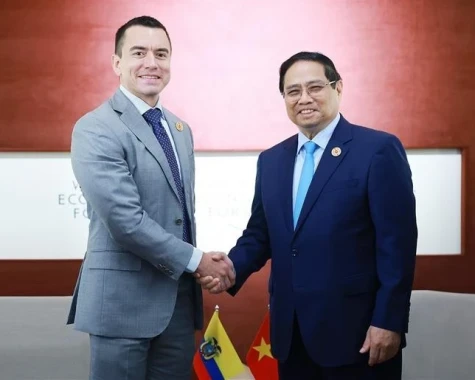Yesterday afternoon (April 22), Binh Duong provincial Party Standing Committee convened the 47th provincial Party Executive Committee Conference. During the meeting, the provincial Party Executive Committee reached a unanimous decision to approve the project aimed at merging provinces, discontinuing district-level activities, reorganizing commune-level administrative units, and restructuring the political system following the reorganization.
Historic milestone
In his address at the conference's opening, Mr. Nguyen Van Loi, a member of the Party Central Committee, Secretary of the provincial Party Committee, and Head of the provincial National Assembly Delegation, underscored the significance of the 47th Conference, which addressed crucial matters such as the reorganization of commune-level administrative units, the dissolution of district-level activities, the restructuring of provincial governance, and the establishment of a two-tier local government. “This is a historic moment; we are both proud and honored, yet we bear an immense responsibility as the architects of today’s history,” the provincial Party Committee Secretary remarked, urging his colleagues in the Party Executive Committee to embrace their responsibilities, engage in earnest discussions, and effectively implement the organizational framework necessary for the development of a two-tier local government. He also emphasized the importance of maintaining focus on other essential tasks, particularly those impacting citizens and businesses.

In a brief report on the initiative to conclude district-level activities, reorganize and consolidate commune-level administrative units, and establish the commune-level political system post-reorganization, Mr. Nguyen Loc Ha, Standing Deputy Secretary of the provincial Party Committee, emphasized the implementation of Resolution No. 60-NQ/TW dated April 12, 2025, from the 11th Conference of the 13th Party Central Committee, along with the Central Committee's guiding documents regarding the plan to merge provincial-level administrative units, eliminate district-level structures, consolidate commune-level units, and develop a two-tier local government organization model. The Standing Committee of the provincial Party Committee has formed a Steering Committee and three working groups to expedite the advisory process for project development. The Steering Committee has diligently and promptly drafted the project for submission to the provincial Party Committee Standing Committee for review and feedback during nine meetings, and has presented it to the provincial Party Committee for consideration and comments on three occasions (including two online conferences and one in-person conference), with the involvement of 25,000 party members.
"At the conference, the leaders of the provincial Party Committee's Propaganda and Mass Mobilization Commission provided an overview of the reception and clarification of feedback regarding the project. Meanwhile, the leaders of the provincial Party Committee's Organization Commission introduced the draft plan from the provincial Party Committee's Standing Committee aimed at continuing the implementation of several tasks until the conclusion of district-level activities and the operational commencement of commune-level administrative units." |
From April 15 to 21, 2025, the provincial Party Standing Committee executed a plan to gather feedback from Party committees, former Party committee members at all levels, cadres, party members, and the public regarding the draft project. A total of 103 conferences were organized, spanning from the provincial to grassroots levels, and 425,424 ballots were distributed to solicit opinions from cadres, party members, and the public. There was a consensus among cadres, party members, and the public in support of the Central Government's policy to merge Binh Duong province with Ho Chi Minh City and Ba Ria - Vung Tau province, designating the new entity as Ho Chi Minh City, with the political-administrative center situated in present-day Ho Chi Minh City. There was strong agreement on the number of commune-level administrative units in Binh Duong province post-merger and consolidation, which is set at 36 units (24 wards and 12 communes), with administrative boundaries, names, and headquarters of communes and wards arranged and merged in accordance with the project for feedback. Additionally, some opinions were raised suggesting further examination of the names and administrative boundaries of certain new communes and wards following the reorganization. On April 21, 2025, the Standing Committee of the provincial Party Committee convened, engaging in a democratic discussion, meticulously considering all aspects, and fully incorporating the relevant feedback to finalize the project.
Implement the principle of job availability for individuals
In his concluding remarks at the conference, Mr. Nguyen Van Loi underscored the necessity of comprehensively understanding that the merging of provinces, the reorganization of administrative units, and the restructuring of the political system are essential for development. These changes aim to enhance the efficiency and effectiveness of the political system and state management agencies while improving the quality of service provided to the populace. The provincial Party Secretary noted that the arrangement of commune-level administrative units should unify the policy of reducing the current number of such units by approximately 60-70% in accordance with the national average. Simultaneously, it is crucial to adhere to the criteria set forth by Central regulations. However, careful consideration must be given to appropriately and harmoniously rearranging the spatial layout to ensure accessibility for the people, facilitating convenience for individuals and businesses in production, commerce, and the management of administrative procedures and daily life.
The provincial Party Secretary urged that Party committees, Party organizations, authorities, agencies, and units throughout the province fully comprehend the perspective: the reorganization of the apparatus aims to enhance staff quality, rather than to legitimize existing deficiencies. In this context, the selection, arrangement, and assignment of personnel following the merger must be executed with care, objectivity, impartiality, and rigor, prioritizing the collective interest above all else.
“Absolutely refrain from being subjective or emotional, and do not compromise procedures or principles due to personal relationships or favoritism. Each selected cadre must exemplify outstanding qualities, capabilities, and prestige, earning the trust of both the collective and the public. It is imperative to adhere to the principle of 'selecting individuals,' rather than 'individuals choosing positions.' Consequently, the supporting staff agencies must conduct a thorough assessment of the current cadre team, categorizing them based on their capabilities, strengths, public ethics, adaptability, and potential for development to ensure appropriate placements,” emphasized provincial Party Secretary Nguyen Van Loi.

The head of the provincial Party Committee has also called for the immediate formation of two teams to evaluate and provide guidance on personnel matters at the provincial level: one team will focus on personnel work for Party agencies, the Fatherland Front, and mass organizations, while the other will address personnel work for the commune-level government. This initiative should be implemented in accordance with decentralization principles, with clearly defined authorities. Officers from the provincial Party Standing Committee and the provincial Party Committee will be assigned to lead and collaborate with relevant agencies on personnel tasks and to oversee grassroots congresses. Furthermore, it is essential to prioritize ideological work among cadres impacted by the restructuring. Those who have not been reassigned must be encouraged, provided with clear explanations, and prepared as reserve personnel to avoid passivity and a hesitant mindset, as well as any negative behaviors.
In addition to the task of organizing cadres, the provincial Party Secretary emphasized the importance of effectively executing several key initiatives in the near future, which include: placing significant emphasis on propaganda, mobilization, and the orientation of public opinion, as well as ensuring robust ideological engagement among cadres, party members, and the populace; preparing the operational headquarters for newly established commune and ward administrative units following their arrangement; and ensuring that all levels and sectors diligently prepare for the organization of the ceremony to announce and inaugurate the new commune and ward administrative units post-arrangement.
“With a spirit of innovation, strong political resolve, and the consensus of the entire political system and populace, we are confident that the Binh Duong provincial Party Committee will successfully execute this project. This will contribute to the establishment of a streamlined, effective, and efficient apparatus that better serves the people, while also fostering the rapid and sustainable development of the province in this new era,” emphasized Secretary of the provincial Party Committee Nguyen Van Loi.
Reported by Tri Dung - Translated by Vi Bao









